Let’s talk about having it all, that old saw that’s kept women miserable and insecure at least since Helen Gurley Brown. Psychological suspense works the same cultural nerves that keep women feeling inadequate and helpless. In its familiar form it’s known as domestic suspense, with women being gaslighted, tortured, and otherwise driven nearly mad from forces within their households. But fast forward to the present day and women are not just vulnerable at home: there is the workplace scheming and plotting to fret about.
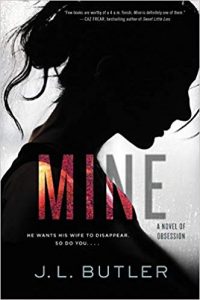
J.L. Butler, Mine: A Novel of Obsession (William Morrow)
Francine Day is a divorce attorney on the rise until she falls into an ill-advised affair with a new client, Martin Joy. Francine knows that it’s wrong and worse—that it could put an end to the career she worked so hard to build. Things get even more complicated when Martin’s soon-to-be-ex-wife, minor socialite Donna Joy, goes missing on the same night Francine was spying on the couple. Throw in a couple of blackouts and another man interested in Francine and Mine gets deliciously intense.
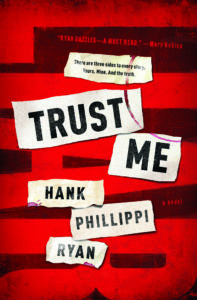
Hank Phillippi Ryan, Trust Me (Forge)
In her first standalone Ryan uses her real-life reporting chops (she is an Emmy-winning investigative reporter at a TV station in Boston) to frame a story about a journalist with a tough assignment. Mercer Hennessey is supposed to write about the most sensational crime in Boston: a woman named Ashlyn Bryant is accused of murdering her daughter, Tasha Nicole. Hennessey is still grieving for her husband and daughter, who were killed in a car accident, but she accepts the assignment, thinking she can drown herself in her work. But the trial takes some unexpected twists, and Hennessey’s assignment to write about Bryant becomes extremely personal.
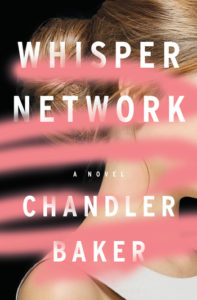
Chandler Baker, The Whisper Network (Flatiron Books)
If it weren’t so intelligent and thoughtful, the Whisper Network would be a perverse book, taking advantage of the #MeToo era in the service of telling a story about the mating habits of corporate lawyers. But Whisper serves as both evidence of our current sexual climate and as one of the few non-domestic suspense books to feature women and their relationships. Sloane, Ardie, and Grace are all corporate lawyers and close friends. The action of the book kicks off when the CEO kicks the bucket, leaving Ames, their boss, the natural successor. Yet Ames has done his share of dirty deeds, some of which the women know about and some they just suspect. When he starts paying too much attention to a pretty associate, the women decide they have to take action–yet in doing so, each is putting something precious at risk.
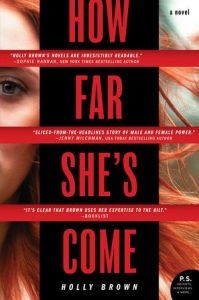
Holly Brown, How Far She’s Come (William Morrow)
A book that deserves more of a readership than it found, How Far She’s Come is set in a cutthroat newsroom for cable network INN, a forward-thinking force in the news field. Recent grad Cheyenne Florian is discovered doing commentary on the web and offered a plum job as an INN correspondent. But when she gets to New York City and starts her job not everything is as rosy as she’d hoped: her boyfriend back in California resents her success; the women at the station are not thrilled by their boss’s attempt to inject youth into their programming; and when Cheyenne receives pages warning her about the network from a mysterious journal that supposedly belonged to another promising correspondent from 1991, she has to use her investigative skills to figure out who wants her gone.
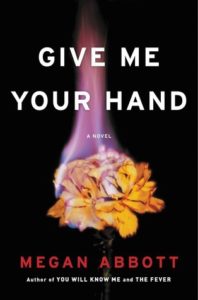
Megan Abbott, Give Me Your Hand (Little Brown)
Abbott always dives deep into her settings: cheerleading in Dare Me; gymnastics in You Will Know Me; the less than fatale femmes of Hollywood in Die a Little; and a research lab led by a prominent doctor in Give Me Your Hand. Two former friends and classmates, Kit and Diane, are both chomping to work on the cure for a women’s disease under the eminent Dr. Severin. But Diane knows a secret about Kit that could destroy them both, and the project they are so eager to be a part of.
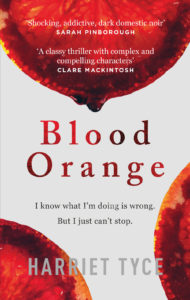
Harriet Tyce, Blood Orange (Grand Central)
Tyce’s debut is an excellent psychological thriller. Young lawyer Alison is defending in her first murder case. Her client, a quiet housewife accused of killing her husband, is indeed guilty of stabbing him, but as Alison investigates the case she finds there might be more to the story than a lover’s spat. Meanwhile, she’s having a blistering affair with a senior attorney at her firm which threatens her own happy family life—and someone bent on destroying her knows her secret.

Renee Knight, The Secretary (Harper Collins)
Christine Butcher is the secretary of the title. She works as a high-powered assistant to supermarket heiress Mina Appleton, who is also a TV host and media personality. It’s a fruitful relationship for twenty-plus years, with Mina giving orders and Christine eagerly doing everything to smooth out Mina’s life. But when Mina is accused of wrongdoing, Christine is forced from the background into the public eye, since Christine must have known about, if not participated in, Mina’s malfeasance. This is one of those books that gives what would have been a minor player the role of protagonist, with excellent results.

Zoe Heller, What Was She Thinking? Notes on a Scandal (Henry Holt)
This popular and clever novel (later made into a film with Cate Blanchett) tells the sinister tale of that hated yet fascinating archetype: the female high school teacher who seduces her male student into an illicit affair. When the scandal breaks—come on, you knew from the title it wasn’t going to stay secret—Heller really gets to work exploring both what happens to the characters in the glare of the press spotlight and how especially the art teacher, Sheba Hart, reacts to the public opprobrium. Underlying all of this glorious scandal is Hart’s unlikely friendship with a lonely fellow teacher, Barbara Lovett, who tries to come to her friend’s defense.

















